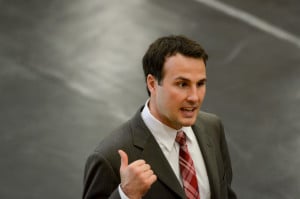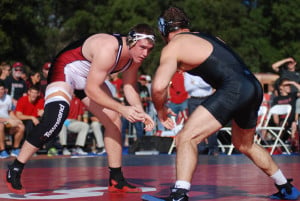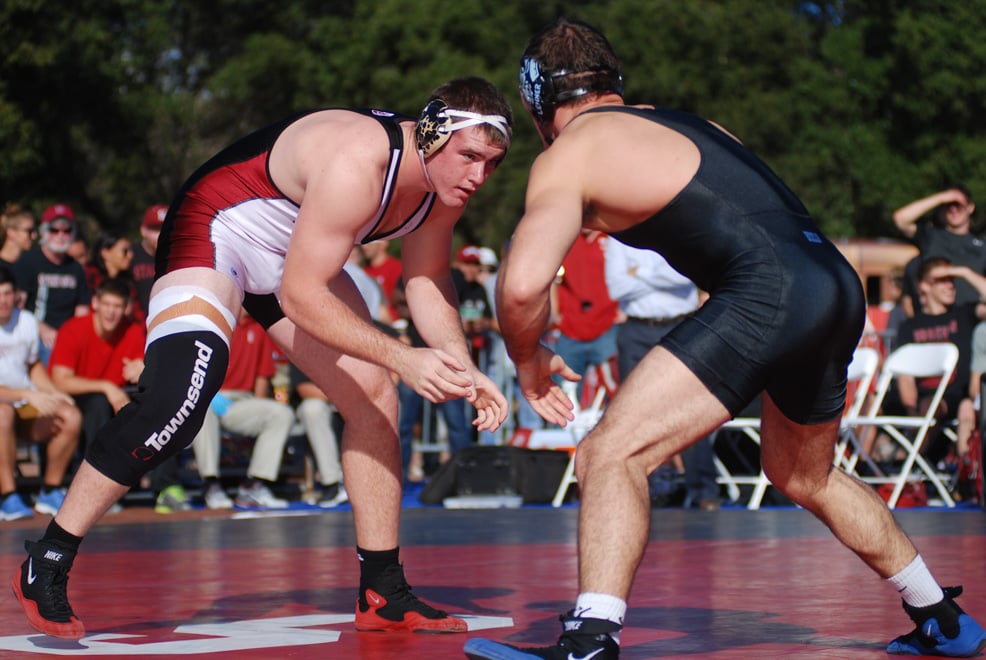In the world of collegiate wrestling, there is a very brutally clear pecking order.

First, there are the elite dynasties of the sport — teams like Iowa, Oklahoma, Oklahoma State and, most recently, Penn State — that rack up championships without breaking a sweat. It’s very much a sport in which the rich get richer — when you’re winning titles, the elite recruits flock to you — and as a result, the 88 national championships in the history of the NCAA have been split among just 12 schools.
And then there’s everyone else. Given how the elites reload year after year, it’s all the other teams in the country can do to just keep up. A national championship isn’t necessarily out of the question, but it’s probably a far-fetched dream at best.
“You often hear how it’s unrealistic to expect to win a national championship in wrestling if you’re not one of five or six programs, because only five or six programs have won national championships in the last 50 or so years,” says Stanford head coach Jason Borrelli.
“That’s how it is. I think that in itself leads people to doubt whether or not they can do it, which lowers your expectations.”
Stanford has always been firmly embedded in the “everyone else” club.
Stanford has never even won a conference title, much less a national one. In fact, Stanford has only once beaten Oregon State — the winner of five of the last six Pac-12 titles — since the teams first met in 1953.
But ever since Borrelli and his coaching staff took over the program eight years ago, he’s been determined to shake up the status quo.
He’s never bought into the idea that a non-traditional power can’t possibly keep up with the elites of the wrestling world. He didn’t eight years ago, when it was tough for him to get his athletes to buy in to the idea that Stanford wrestling, too, can be elite — and he certainly doesn’t now, riding a streak of two consecutive top-three finishes at the conference championship meets.
“I can’t imagine why you would ever settle for something beyond the best,” Borrelli says. “If you’re willing to put the sacrifices, put the work in and have the passion, why would you ever want to be fifth or 10th or 15th?”
Borrelli truly believes that this is the year that Stanford won’t have to settle for fifth or 10th or 15th — he feels that this year, the Stanford Cardinal finally have the potential to break down the door and crash the party atop the wrestling world.
“This is the best time to be a Stanford student-athlete because we still haven’t ever won our conference, we haven’t finished in the top 10, and we can be the first,” Borrelli says.
“When you get people excited about being the first and doing something like that, you get a new passion and enthusiasm and excitement.”
Buying into a new attitude
“It starts with belief. It starts with the coaches and the student-athletes believing. We could get all the guys to the national tournament, but if none of them really believe in it, it won’t happen.”

Let’s be clear here — it would be one thing if Borrelli’s lofty goals didn’t seem realistic, but now that Stanford wrestling is clearly trending up, a breakout party almost just seems like the logical next step.
In 2014, the team set a new program record in dual wins with 17 and followed it up with a second-place finish at the Pac-12 Championship. Last season, Stanford started the dual season 11-2 and finished third at the Pac-12s.
“You can tell if a program has made progress by how seriously the top athletes are taking a look at your program,” Borrelli says. “We’re in the hunt now.”
You can see that progress manifested the form of one Joey McKenna, the impact freshman at 141 pounds that spurned the advances of nearly every traditional wrestling power to come wrestle for Stanford. Not only has McKenna dominated at 141 all season for Stanford, but he’s also immediately bought into the winning attitude that Borrelli always hoped to instill in the program.
Even a few years ago, Borrelli remarked that the idea of winning as the norm was pervasive among the coaches and a few of the senior leaders on the team, but not necessarily throughout the roster.
But now, with tangible evidence of success in hand and young, stellar recruits like McKenna that bring that winning spirit to the team from day one, the attitude of the team is noticeably different.
“That’s the attitude that the top programs like Penn State and Iowa and Oklahoma State have in the room,” says redshirt sophomore heavyweight Nathan Butler. “We’re not just trying to win something; we’re expecting to win it.”
And finally, Borrelli also believes that Stanford has found the missing piece of the puzzle that has been holding the team back for so long as well: A willingness to go above and beyond for the team, something particularly important in a sport like wrestling in which individuals are ranked as well as teams, and in which many wrestlers’ individual records around the nation are just as important, if not more so, than their teams’ records — especially for those in traditionally weak programs.
“Are you happy to win?” Borrelli asks.
“Because if you’re just happy to win, it almost seems like you’re just caring about yourself,” he continues. “If you’re fighting for that extra takedown so that you can get your team one more point, that’s showing everyone on that bench — everyone in the stands — that you care more about the team than yourself.”
And this year, everybody has bought into that team ideal as well. Everyone’s going the extra mile and enthusiastically dedicating themselves to it. Decisions are becoming major decisions; major decisions are becoming technical falls; technical falls are becoming pins.
“They are smart enough to look around and recognize their teammates and recognize that we can do this,” Borrelli says. “Whereas they would be smart enough also to look around and know if we didn’t have the potential to do that.”
“And when you start hearing them believe in it, you know that they recognize what we have in our program. And that’s exciting.”
And let’s face it: Winning is exciting, too.
“Not only are we training hard, but we’re having fun,” Butler said. “And I think that’s the difference that it’s been from years before. It’s a good time to be part of the program.”
Wrestle like the chaser, not the chased
“When you’re getting chased, you’re panicking and you could make a wrong move. When you’re chasing someone down, you just go for it. You don’t care.”
The beauty of this slow rise in national relevance is that although Stanford has set lofty expectations for itself, those expectations don’t necessarily exist outside of the program. That means that there’s no pressure — the team doesn’t really have anything to lose because nobody expects it to win anyway, but it truly does have everything to gain with its sky-high potential.
“Oregon State is still the favorite to win the conference, and Penn State is still favored to win nationals,” Borrelli says. “So until we’re the favorite to win either of those, there should be no pressure.”
Even though they’re not on anybody’s radar, the Cardinal are still preparing for the end of the season like a championship team. Sure, a win over Oregon State would be significant given the teams’ history. Sure, a win over Oklahoma State would be a win over a top-five program.
But that’s not enough for Borrelli. He feels that having the attitude of going all-in on a national run is the correct mindset to have for a team like Stanford — even when it technically hasn’t even taken a noticeable step towards true national success yet — because when that step finally comes, the team needs to drive its own success instead of just riding the wave.
“Although I want to close the regular season out, I’m trying as a coach to keep perspective on conference and nationals because that’s so much more important than whether or not we beat Oregon State in a dual meet,” Borrelli says.
“As much as it would mean to the program and the guys, it’s not something that I’m overly highlighting. It is highlighted and we’re aware of what’s at stake, but we also know there’s a bigger picture.”
The wrestlers themselves understand that. They now understand that championship teams don’t just want to win — they expect to do so. Even though they haven’t beaten Oregon State since 2004, there’s no doubt in their minds that they’ll win that dual this year. (“We beat Oregon State, 10 times out of 10,” Butler says.)
While this relentless confidence might be concerning to some coaches and might even seem downright arrogant to others, Borrelli loves the attitude because he realizes where he is: at Stanford, where there isn’t anything that can stand between a determined student and his goal.
“A Stanford athlete — when you get them excited about something and when you get them to believe that something’s going to happen, they usually figure out how to do it,” Borrelli says with a smile.
“Now we’ve got the guys feeling passion about it and we’ve got them believing in it, so it’s going to happen. There’s no doubt.”
And once Stanford does break the chains that are holding it down beneath the top of the Pac-12, Borrelli senses that the floodgates are set to open for this program, making it doubly important that the team already has a confident, championship-worthy mindset to prepare it for the national titles that he truly believes this team can contend for this season.
“I feel like once we knock the door down on a conference level, we’re going to go on a big run. I think Stanford is going to win a conference championship, and then there’s going to be five, six, seven, 10 in a row.”
And with that success, the final stage of Borrelli’s plan is to make sure that the fundamental paradigm of Stanford wrestling shifts such that these discussions — about beating Oregon State, about winning a Pac-12 title — are just footnotes as the team hopefully takes its place among the elites of the sport in the near future.
“We want to get to the point where winning a conference championship is not even in the discussion. We don’t think about that. There’s no peaking for that. That is a blip on the bigger scale of winning the national title. That’s just a little hurdle in the way.”
While it may be easy to say that Borrelli and his gang are jumping the gun, that their confidence is unwarranted, that they shouldn’t be talking such a big game before they actually earn anything, keep in mind that this is the attitude that has already brought the program from consistent futility to borderline contenders under Borrelli’s watchful eye.
And now, with Borrelli’s job of changing the program’s attitude and mindset seemingly out of the way, he’s ready to step aside, let his boys take the reins, and watch the fruits of his handiwork blossom.
“It’s just breeding itself,” Borrelli said. “It doesn’t have to be us coaches planting the seed. The seed has been planted, and now we’re just watching it grow and blossom. It’s fun.”
Contact Do-Hyoung Park at dhpark ‘at’ stanford.edu.
